Book of James ~ Follow-up Quiz ~ Answers
advertisement
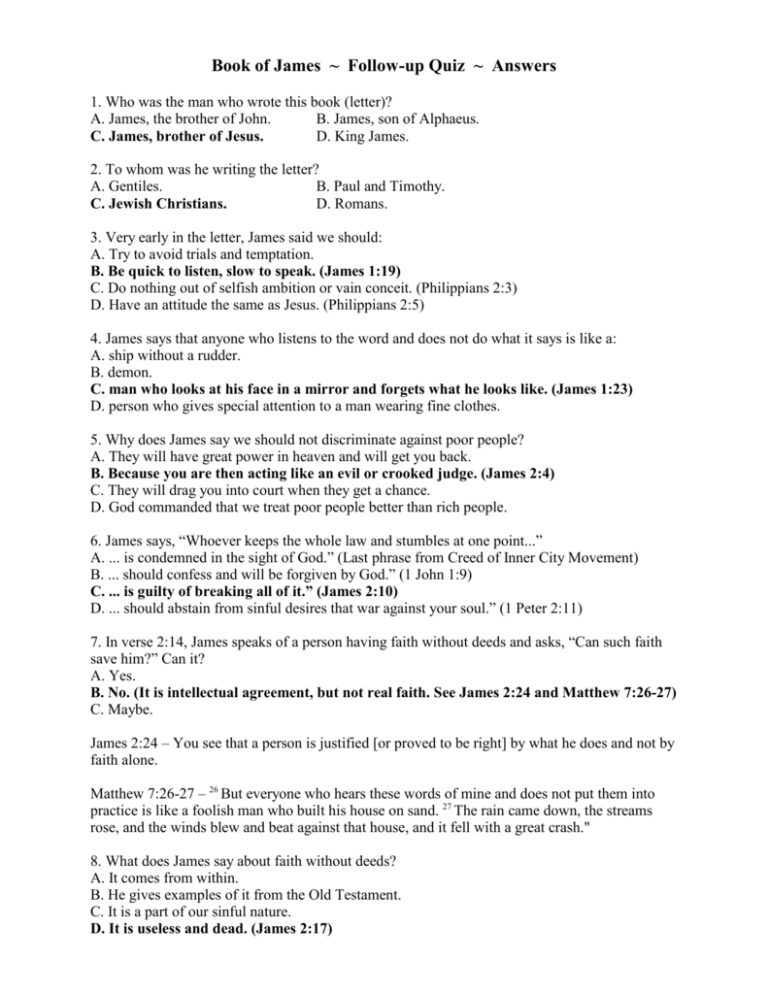
Book of James ~ Follow-up Quiz ~ Answers 1. Who was the man who wrote this book (letter)? A. James, the brother of John. B. James, son of Alphaeus. C. James, brother of Jesus. D. King James. 2. To whom was he writing the letter? A. Gentiles. B. Paul and Timothy. C. Jewish Christians. D. Romans. 3. Very early in the letter, James said we should: A. Try to avoid trials and temptation. B. Be quick to listen, slow to speak. (James 1:19) C. Do nothing out of selfish ambition or vain conceit. (Philippians 2:3) D. Have an attitude the same as Jesus. (Philippians 2:5) 4. James says that anyone who listens to the word and does not do what it says is like a: A. ship without a rudder. B. demon. C. man who looks at his face in a mirror and forgets what he looks like. (James 1:23) D. person who gives special attention to a man wearing fine clothes. 5. Why does James say we should not discriminate against poor people? A. They will have great power in heaven and will get you back. B. Because you are then acting like an evil or crooked judge. (James 2:4) C. They will drag you into court when they get a chance. D. God commanded that we treat poor people better than rich people. 6. James says, “Whoever keeps the whole law and stumbles at one point...” A. ... is condemned in the sight of God.” (Last phrase from Creed of Inner City Movement) B. ... should confess and will be forgiven by God.” (1 John 1:9) C. ... is guilty of breaking all of it.” (James 2:10) D. ... should abstain from sinful desires that war against your soul.” (1 Peter 2:11) 7. In verse 2:14, James speaks of a person having faith without deeds and asks, “Can such faith save him?” Can it? A. Yes. B. No. (It is intellectual agreement, but not real faith. See James 2:24 and Matthew 7:26-27) C. Maybe. James 2:24 – You see that a person is justified [or proved to be right] by what he does and not by faith alone. Matthew 7:26-27 – 26 But everyone who hears these words of mine and does not put them into practice is like a foolish man who built his house on sand. 27 The rain came down, the streams rose, and the winds blew and beat against that house, and it fell with a great crash." 8. What does James say about faith without deeds? A. It comes from within. B. He gives examples of it from the Old Testament. C. It is a part of our sinful nature. D. It is useless and dead. (James 2:17) 9. Why does James say that not many people should try to become teachers? A. Because teachers spend most of their time with discipline and not with teaching. B. Because there were (and are) too many teachers already. C. Because teachers are judged to a higher standard than other professions. (James 3:1) D. Because teaching does not pay well. 10. James says that the tongue ___________ the whole person. (James 3:6) A. corrupts (defiles, dirties) (James 3:6) B. controls (guides, governs) C. reflects (mirrors, imitates) D. kills (flames, strangles) 11. Which of these examples did James not use to show that if you control your tongue you can control your body? A. A bit in the mouth of a horse. (James 3:3) B. Rudder steers a ship. (James 3:4) C. Tiny mustard seed produces very large tree. (Matthew 13:31) D. Small spark starts a forest fire. (James 3:5-6) 12. James says that wisdom is demonstrated by: A. the ability to make wise decisions in difficult circumstances. B. living the good life and doing deeds in humility. (James 3:13) C. not being bitter, jealous, and selfish. D. following the Proverbs of Solomon. 13. What causes fights and quarrels among you? A. The devil. B. Your desires. (James 4:2) C. Anger and temper. D. Your brothers and sisters and other people. 14. Can you love both God and the world? A. Yes. B. No. C. Partially. 15. What happens if you try to love both God and the world? A. You’ll slip on a banana peel. B. Foolish pride will prevent you from receiving God’s grace. (James 4:6) C. You will become an enemy of the world. D. God will help you make lots of money. 16. Which of these are NOT commanded by James in vs. 4:7-10? A. Resist the devil. (James 4:7) B. Grieve and mourn. (James 4:9) C. Be joyful in the Lord. (Habakkuk 3:18) D. Humble yourself. (James 4:10) Habakkuk 3:17-18 – 17 Though the fig tree does not bud and there are no grapes on the vines, though the olive crop fails and the fields produce no food, though there are no sheep in the pen and no cattle in the stalls, 18 yet I will rejoice in the Lord, I will be joyful in God my Savior. 17. James advised against boasting about your plans. Why? A. Making a profit is bad. B. You’ll disappear like a mist. (James 4:14) C. People worship their plans like an idol D. Pride is bad. (James 4:16) 18. In chapter 4, James moves from sins of commission to sins of omission of what? A. Not planning ahead. B. Not telling others about Jesus. C. Not worshiping the Lord with all your heart. D. Knowing what to do and not doing it. (James 4:17, Luke 12:47, John 9:41) Luke 12:47 – That servant who knows his master’s will and does not get ready or does not do what the master wants will be beaten with many blows. John 9:41 – Jesus said [to some Pharisees], “If you were blind, you would not be guilty of sin; but now that you claim you can see, your guilt remains.” 19. James says that “the coming of the Lord is near (or at hand).” When does that mean? A. Tomorrow. B. James thought He was coming back then (but he was wrong). C. It was a poetic figure of speech. D. It means Jesus’ coming is always at hand and could be any time. 20. James says we should be patient in the face of suffering. Why? A. Because farmers wait for the autumn and spring rains. (James 5:7) B. Because Job persevered. (James 5:11) C. Because the Lord is full of compassion and mercy. (James 5:11) D. Because the Lord’s coming is near. (James 5:8) Answer D is probably best, but C is correct also. Answers A and B are examples of being patient, but not the reason to be patient. 21. What does James say will cover a multitude of sins? A. Bringing back someone from the errors of his way. (James 5:19-20) B. Reciting the Lord’s prayer among unbelievers. C. Being firm in your belief so you will not be accused of being neither hot nor cold. D. Taking an oath before the elders of the church. © David Ahl ~ www.BibleStudyMen.com

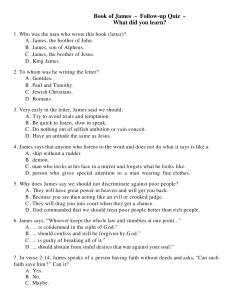


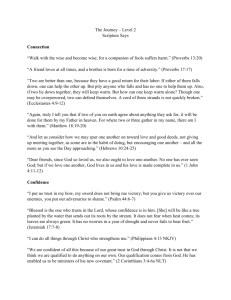




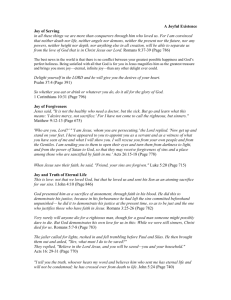

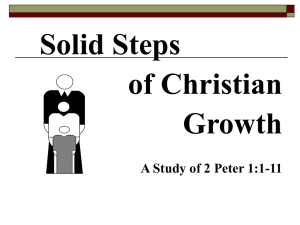

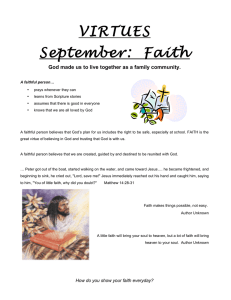
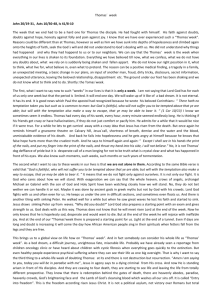

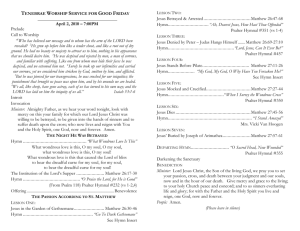
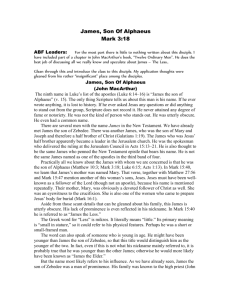
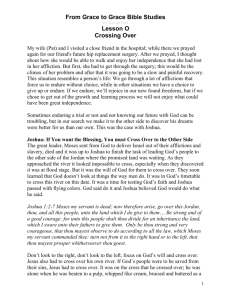
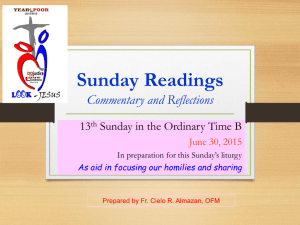
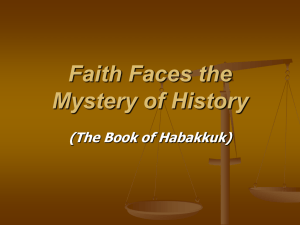
![The Crucial Questions Series By R. C. Sproul EV] 7a 8Saca](http://s2.studylib.net/store/data/018362713_1-dfea5f48309351554b4aa0757313d6db-300x300.png)